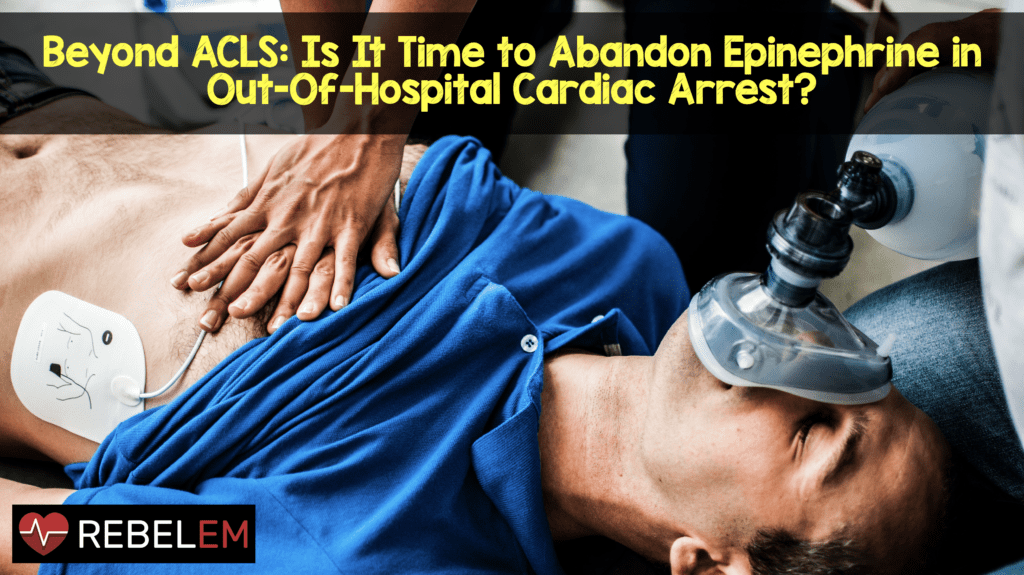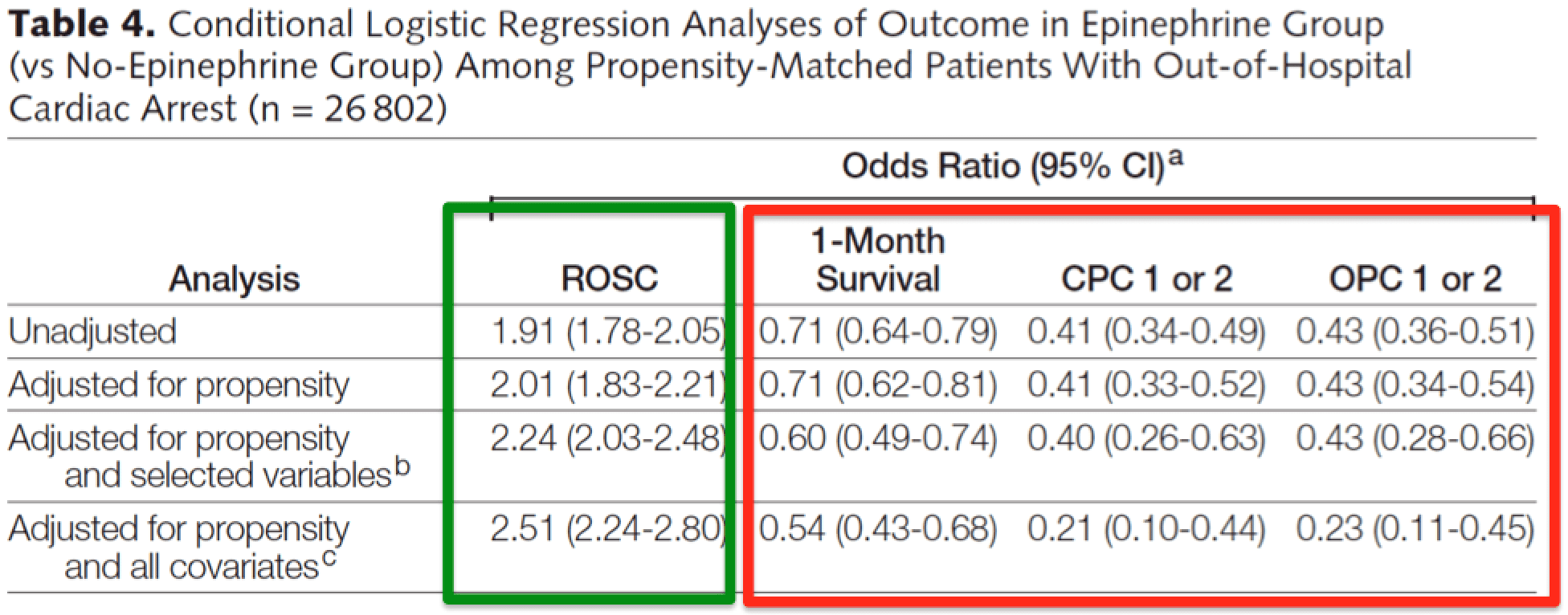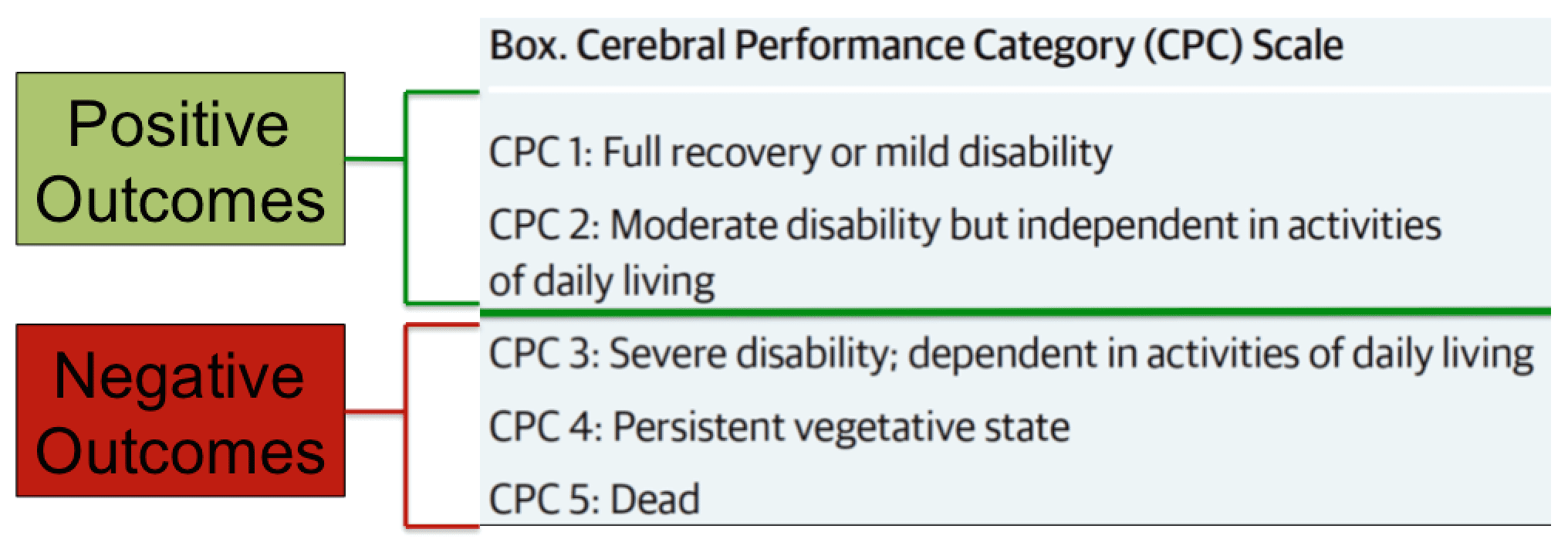 Epinephrine is widely used and recommended by Advanced Cardiovascular Life Support (ACLS) in out-of-hospital cardiac arrest (OHCA), but its effectiveness in neurologic outcomes has never been truly established. To verify effectiveness of epinephrine confounders, such as patients, CPR quality, CPR by bystanders, time from call to arrival at scene or hospital, and much much more, must be controlled for in a trial. This type of study is not easily performed due to ACLS being the current standard of care.
Epinephrine is widely used and recommended by Advanced Cardiovascular Life Support (ACLS) in out-of-hospital cardiac arrest (OHCA), but its effectiveness in neurologic outcomes has never been truly established. To verify effectiveness of epinephrine confounders, such as patients, CPR quality, CPR by bystanders, time from call to arrival at scene or hospital, and much much more, must be controlled for in a trial. This type of study is not easily performed due to ACLS being the current standard of care.
What Studies Have Evaluated the Effectiveness of Epinephrine in Out-Of-Hospital Cardiac Arrest?
- Holmberg M et al. Resus 2002 [1] : Use of epinephrine in OHCA was an independent predictor of increased mortality.
- Ong MEH et al. Ann Emerg Med 2007 [2] : Use of epinephrine in OHCA was not associated with mortality benefit.
- Olasveengen TM et al. JAMA 2009 [3] : Use of epinephrine in OHCA was associated with increased Return of Spontaneous Circulation (ROSC) but was not associated with mortality benefit.
- Jacobs IG et al. Resus 2011 [4] : Use of epinephrine in OHCA was associated with increased Return of Spontaneous Circulation (ROSC) but was not associated with mortality benefit.
Is There a Larger Study Looking at the Use of Epinephrine in OHCA? [5]
What did they do:
- Prospective, Non-Randomized, Observational Propensity Analysis
- 417,188 OHCA Cases in Japan
Outcomes:
- ROSC
- 1 Month Survival
- Survival with Good or Moderate Cerebral Performance Category (CPC) 1 or 2
- Survival with No, Mild, or Moderate Neurologic Disability (Overall Performance Category = OPC) 1 or 2
Results:
Epinephrine in OHCA (Non-Propensity Matched)

Epinephrine in OHCA (Propensity Matched)


Limitations:
- This was an observational study. In other words use of epinephrine was not randomized which can cause a selection bias of what patients got epinephrine and which ones didn’t
- Data on in-hospital CPR quality was not included in this study and could be a confounding factor into neurologic outcome and survival not taken into account.
- There is no standard regimen for OHCA once the patients made it to the hospital (i.e. Induced therapeutic hypothermia, cardiac catheterization, and/or use of vasopressin)
- The number of epinephrine doses received once in the hospital were not recorded
Conclusion of Study: In Japan, the use of epinephrine in OHCA increases the chance of ROSC, but does not increase survival with good neurologic outcomes at one month.
What is considered a “good” Cerebral Performance Category (CPC)?

A “good” outcome would be the ability to perform basic tasks of everyday life, such as eating, bathing, dressing, toileting, and transferring or a CPC score of 2 or less.

Clinical Bottom Line: ACLS is still the standard care in OHCA, which means we still give epinephrine, but the ACLS algorithm should be readdressed and our focus should instead focus on high quality, uninterrupted CPR and early defibrillation.
References:
- Homberg M et al. Low Chance of Survival Among Patients Requiring Adrenaline (Epinephrine) or Intubation After Out-of-Hospital Cardiac Arrest in Sweden. Resus 2002. PMID: 12104107
- Ong ME et al. Survival Outcomes with the Introduction of Intravenous Epinephrine in the Management of Out-of-Hospital Cardiac Arrest. Ann Emerg Med 2007. PMID: 17509730
- Olasveengen TM et al. Intravenous Drug Administration During Out-of-Hospital Cardiac Arrest: A Randomized Trial. JAMA 2009. PMID: 19934423
- Jacobs IG et al. Effect of Adrenaline on Survival in Out-of-Hospital Cardiac Arrest: A Randomized Double-Blind Placebo-Controlled Trial. Resus 2011. PMID: 21745533
- Hagihara A et al. Prehospital Epinephrine Use and Survival Among Patients with Out-of-Hospital Cardiac Arrest. JAMA 2012. PMID: 22436956
For More on this Topic Checkout:
- Scott Weingart at EMCrit: EMCrit Wee – Abandon Epinephrine?
- Anand Swaminathan at emDocs: Epinephrine in Cardiac Arrest
- The Bottom Line: Hagihara – Prehospital Epinephrine Use and Survival Among Patients With Out-Of-Hospital Cardiac Arrest
- Justin Morgenstern at First10EM: Epinephrine in Out of Hospital Cardiac Arrest – A Review of All the Evidence



